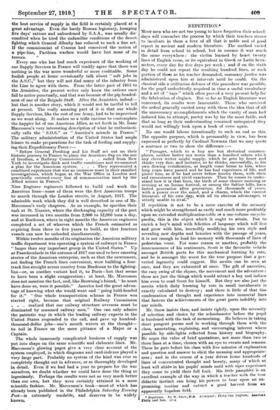REPETITION.*
MOST men who are not too young to have forgotten their school- days will remember the process by which their teachers strove
to inculcate in them a love of all that is noble and of good report in ancient and modern literature. The method varied in detail from school to school, but in essence it was much the same everywhere : the victim learned by heart twenty lines of English verse, or its equivalent in Greek or Latin hexa- meters, every day for five days per week ; and if on the sixth day he could not repeat the resulting hundred lines, or such portion of them as his teacher demanded, summary justice was administered upon him at intervals until he could. On the classical side a utilitarian defence of this procedure was possible, for the pupil undoubtedly acquired in time a useful vocabulary and a set of " tags " which often proved a very present help for the fabrication of elegiacs. But so far as English literature was concerned, its results were lamentable. Those who survived the ordeal generally carried away with them the idea that of all the unnecessary accomplishments which the vanity of man had induced him to attempt, poetry was by far the most futile, and that so long as their understanding remained unimpaired they would not willingly look upon a book of verse again.
No one would labour intentionally to such an end as thin The opposite purpose, which is presumably in view, has been expressed so perfectly by Cardinal Newman that we may quote a sentence or two to show the difference :-
" Passages, which to a boy are but rhetorical common- places, neither better nor worse than a hundred others which any clever writer might supply, which lie gets by heart and thinks very fine, and imitates, as he thinks, successfully, in his own flowing versification, at length come home to him, when long years have passed and he has had experience of life, and pierce him, as if he had never before known them, with their sad earnestness and vivid exactness. Then he comes to under- stand how it is that lines, the birth of some chance morning or evening at an Ionian festival, or among the Sabine hills, have lasted generation after generation, for thousands of years, with a power over the mind, and a charm, which the current literature of his own day, with all its obvious advantages, is utterly unable to rival."
If repetition is not to be a mere exercise of the memory
which might be strengthened as easily and much more profitably upon an extended ibultiplication-table or a one-volume encyclo- paedia, this is the object which it ought to attain. But to enrich a boy's mind with felicities of language which will live and grow with him, insensibly modifying his own style and revealing new depths and beauties with the passage of years, it is not enough to load his memory with thousands of lines of pedestrian verse. For some reason or another, probably the innocuousness of his sentiments, Scott is the favourite vehicle amongst British poets for this mechanical learning by rote, and he is amongst the worst for the true purpose that a per- verted ingenuity could suggest. His merits can be seen at once, and they are exhausted at once. The gift of narrative, the easy swing of the rhyme, the movement and the adventure : these are just the things which would attract a boy and induce him even to read Scott for himself. But they are also just the merits which daily learning by rote in small instalments is exactly calculated to destroy ; and there is little of that fine condensation of thought and experience into immortal lines that fastens the achievements of the great poets indelibly into our minds.
Mr. Snow insists then, and insists rightly, upon the necessity of selection and choice by the schoolmaster before the pupil is burdened with the task of memorizing. He believes in taking short pungent poems and in working through them with the class, annotating, explaining, and encouraging interest where possible by side-lights reflected from history and biography.
He urges the value of brief quotations, not more than two or three lines at a time, chosen with an eye to events and seasons. These he puts before his class with five minutes of explanation and question and answer to elicit the meaning and appropriate- ness ; and in the course of a year drives home hundreds of lines of concentrated thought and beauty, many of which at
least will abide• in his pupils' minds until with riper experience they come to yield their full fruit. His little pamphlet is an excellent example of the way in which a teacher with the true
didactic instinct can bring his powers to bear upon an un- promising routine and extract a good harvest from an apparently hopeless field.
• Repetition. By w. Snow, M.A. Liverpool : Son Nephew. Landow; Philip and Sun. IFF.j


































 Previous page
Previous page